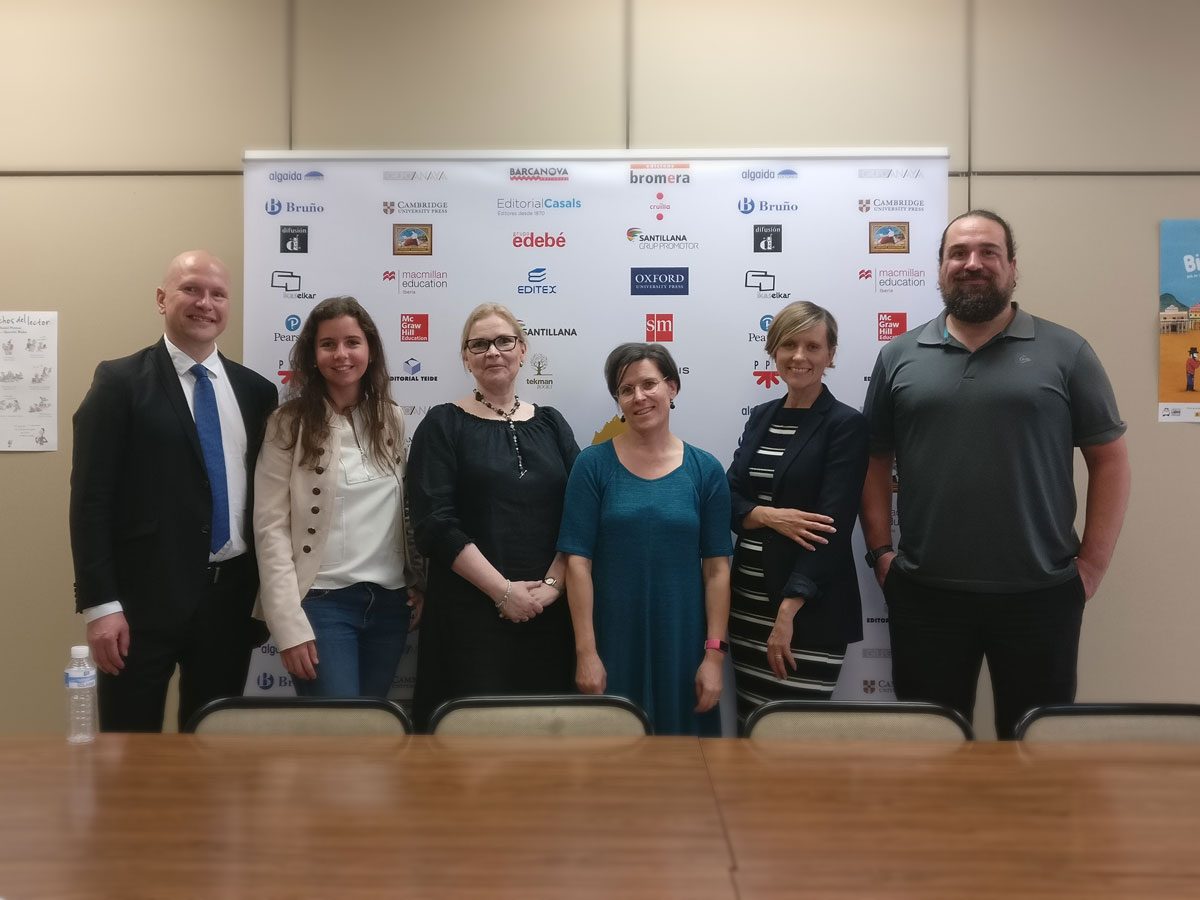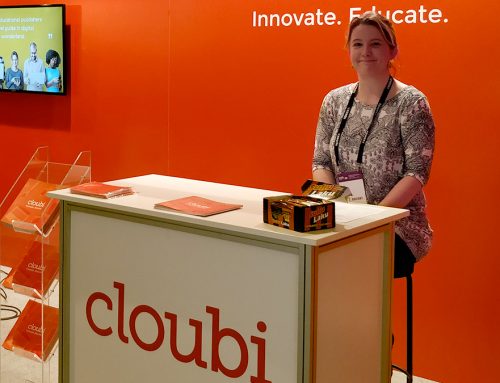We had the honour of co-hosting an event for Spanish educational publishers in Madrid in late May. The event, organized by the Spanish Educational Publishers’ Association ANELE, gave the members of the association an opportunity to get deeper insights into the Finnish education system, and a glimpse into how Cloubi has been used by publishers accros Europe to produce digital materials allowing for new inspiring ways of learning. Both topics turned out to be of great interest and we were delighted to deliver our presentations to a very active audience of 30 publisher participants.

Our power team in Madrid, from left to right: Tero Rynkä (Cloubi), Ana Ortiz Roca (Ormobook), Selja Saarialho (Cloubi), Kaija Kaasinen (Otava), Tiina Mäkelä (Univ. of Jyväskylä) and Victor Font (Ormobook)
The core of the Finnish education system
The event started with an introduction to the fundamental principles and values behind the Finnish education system and the current National Core Curriculum by Project Researcher, PhD Tiina Mäkelä from the University of Jyväskylä. She emphasized the importance of two principles underlying the system, equality and quality, in making it the success story it is today. In Finland all students are treated equally regardless of the social or economic background of their family. “The welfare society is accessible to everybody at school,” she said.
The system also accounts for all kinds and levels of learners, putting a strong emphasis on the personalization of teaching – this gained even more ground in the latest National Core Curriculum which came into effect in 2016.
Culture of trust
In Finland, education has always been regarded as a cornerstone for the nation’s success. “The whole society is focused on supporting education,“ Ms Mäkelä explained. This can also be seen in the culture of collaboration and participation prevailing in schools. Teachers can actively participate in the development of the curriculum at the school level. In general, there is mutual trust among the interest groups in education; Finnish society has high moral standards, which makes autonomy possible for schools and teachers.
Nevertheless, the most important success factor that Ms Mäkelä wanted to highlight is the teacher. The race to become a teacher is tough: it’s harder to gain entry to the teacher education programme than it is to law or medical programmes. The students becoming teachers are top of their class, and teachers are regarded as respected professionals of education, a fundamental pillar of society.
Focus on the good
As an answer to a question from the audience on how to implement a similar system in Spain, Ms Mäkelä emphasized the importance of long-term planning and advised to focus the discussion on the future generations – they will be the drivers for real change. “Recognize the success of good practices that are going on in many schools in Spain. Be self-critical – as we are despite our PISA success – but don’t fall into the pessimism pit. Focus on the many good things in your schools, and value and support your teachers,” she concluded.
The new curriculum: How to make a change in the classroom?
Ms Mäkelä’s talk was followed by a presentation on what the adoption of the national curriculum entailed from the publishers’ – and teachers’ – perspective. Product Manager Kaija Kaasinen from Otava Learning, one of the leading educational publishing houses in Finland, explained how the concepts of learning and new teaching methods introduced in the curriculum were realized in new learning materials created to support the implementation of the curriculum in schools. Working at the Department of Foreign Languages at Otava – and being a teacher of Spanish and English herself – she presented examples from language materials.
21st century skills
The National Core Curriculum put the 21st century skills to the fore and so should learning materials too, Ms Kaasinen reminded. This implied that teaching methods needed to change as well in order for these skills to be properly incorporated in what you do in the classroom. As an example she mentioned collaboration skills, one of the core competences needed in today’s working life. Learning materials should encourage the kind of activities where students are made to communicate with each other and develop their teamwork skills.
The curriculum – and the core competencies needed in today’s world – also call for the use of technologies in learning. This is why Otava Learning created product families including a comprehensive set of digital products varying from ebooks to teacher’s materials and online tests to help teachers take the required steps in using digital materials.

Making the most of digital channels
The curriculum involves multiliteracy and an increased use of authentic materials and situations for language teaching. With Cloubi allowing for the use of various media assets and digital channels, the new digital products could incorporate videos, audio files, web pages, blogs, chats and other social media as text types.
The digital channels and the use of mobile devices also enhance the students’ abilities and skills to search for information, and to validate and present information – all critical competences in today’s society. “Students must be allowed to take out their mobile phones in class to search for information,” Ms Kaasinen stated.
Content creators can support teachers to adopt new ways of working in the classroom by offering them a wide range of activities to use in class. “Motivation and zest is infectious. If the teacher is motivated to use technology and new kinds of activities, the motivation will be transmitted to the students,” she concluded her inspiring presentation.





